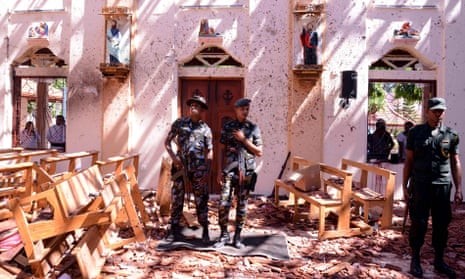
This chilling Dispatches documentary reports on the aftermath of
2019’s apparently random terrorist attack, and alleges unpalatable
truths
Jack Seale
Wed 6 Sep 2023 00.00 BST
On Easter Sunday 2019, six suicide bombings hit Catholic churches and
luxury hotels in Sri Lanka, killing 269 people. Quickly, the perpetrators
were identified as domestic religious extremists the NTJ (National
Thowheeth Jama’ath), claimed by Islamic State as their own. The wider
world, pausing to note that the perceived threat of Islamic
fundamentalism helped the controversial Rajapaksa family regain the
Sri Lankan presidency a few months after the bombings, chalked it up
as yet another terrorist atrocity about which nothing much could be
said or done and moved on.
Sri Lanka’s Easter Bombings, a new Dispatches investigation, makes
serious new allegations about the attacks, based on whistleblower
testimony. While the accusations are startling, they are
straightforward: the charge is that allies of the Rajapaksas had
associations with the NTJ, and that they made it hard for law
enforcement to arrest its leaders prior to the bombings or to fully
investigate the massacre afterwards.
Such information does not fill an hour of television; the programme is
three-quarters done before the bombings take place. But, while the
programme may feel like a 15-minute news report with a 45-minute
preamble, that context is fascinating. The earlier section is a pithy
summary of modern Sri Lankan politics, telling a tale of how
authoritarians wield power, the lengths they will go to when that
power is challenged, and how they lay dormant in the aftermath of
apparent defeat, waiting to return.
We start in 1983, when an armed uprising by Tamil separatists sparked
civil war, before spooling forward to the end of that conflict in 2009.
Actions taken then by the Sri Lankan army, under the presidency of
Mahinda Rajapaksa, have since been widely described as war crimes,
not least by the 2011 Channel 4 documentary Sri Lanka’s Killing Fields –
a film furiously criticised by Sri Lankan authorities.
Rajapaksa and his younger brother Gotabaya, appointed by the
president as defence secretary, had already built a reputation as
leaders to be feared. Numerous political opponents were threatened or
attacked. The film recalls the chilling murder in 2009 of journalist
Lasantha Wickrematunge, the government’s most prominent critic,
who predicted his own demise and left behind an editorial to be
published after his death: “Murder,” he wrote, “has become the
primary tool whereby the state seeks to control the organs of liberty.”
Such violent retribution was, the Dispatches contributors say, believed
to be carried out by a clandestine death squad called the Tripoli
Platoon.
In 2015, the Rajapaksas, who had flooded government posts with
extended family and were beset by allegations of corruption, were
voted out. Senior police officer Nishantha Silva then investigated the
Wickrematunge murder, finding phone record evidence putting Tripoli
Platoon members at the scene. Making his first public statements in
this programme, Silva claims that, despite no longer running the
country, the Rajapaksas still had enough friends in powerful positions
to ensure the case stalled in the Sri Lankan courts.
Dispatches’ star whistleblower is an exile named Hanzeer Azad
Maulana, who spent nearly 20 years working within the Rajapaksas’
inner circle as a translator and aide. And so we come finally to those
headline allegations: Maulana says he was in the room when Gotabaya
Rajapaksa ordered the founding of the Tripoli Platoon. Even more
seriously, he says that in 2018, the year before the bombings, he
brokered a meeting between NTJ members and Suresh Sallay, who was
the Rajapaksas’ head of military intelligence. (Sallay, who was demoted
to an outpost in Malaysia after the end of Mahinda Rajapaksa’s
presidency in 2015, denies this, telling Dispatches he was in Malaysia at
the time of the supposed 2018 meeting. Gotabaya Rajapaksa did not
respond to requests to comment.)
We are told that information from Indian intelligence sources, warning
of an attack by the NTJ on Catholic churches, was not acted upon.
Efforts by the police to arrest NTJ followers were, according to
documents obtained by Dispatches and testimony from a further,
anonymous whistleblower, derailed by briefings from military
intelligence filled with baseless accusations against other groups.
In this thicket of secrets and lies, the film takes time to hear from the
victims, interviewing two survivors of the Easter 2019 attack on St
Sebastian’s church in Negombo. Their memories of seeing loved ones
die – 115 perished at St Sebastian’s, including 27 children – form a
lurching contrast to the smiling face of Gotabaya Rajapaksa, elected as
president in November 2019 on a wave of fierce, fearful nationalism.
The new ruler appointed Suresh Sallay as his new intelligence boss –
Dispatches’ anonymous whistleblower claims to have evidence of Sallay
then obstructing the investigation into the bombings. Sallay, who
denies everything and is now pursuing defamation claims in the Sri
Lankan courts, is still the director-general of the State Intelligence
Service today.
Citizens of many countries are accustomed, in the aftermath of
apparently random and unstoppable terrorist horror, to learning that in
fact the culprits had been “known to the intelligence services” and
ought to have been intercepted. If the allegations here prove correct,
the truth in Sri Lanka is even more disturbing




